Best Friends Forever
One of the toughest problems for dog owners is that dogs
live only a fraction of the time people do.
That means in the course of a lifetime a dog lover might have to face
the passing of several "best friends."
Ten pictures of our dogs hang on the walls of my study as I write
this. Only one of these very special
creatures is still alive. The ten do not
include dogs I had as a child or before Charlene and I were married. That's a lot of goodbyes, and each one hurt
as if it were a son or daughter.
There is no right way to manage your pet's passage onto
another plane. Sometimes they pass
quickly with no forewarning, and sometimes they decline slowly over a long time
of building grief. Sometimes a veterinarian
predicts the end, and sometimes he offers a hopeful medical strategy to keep
the pet alive. Many, if not most, of us
will reach a long way to keep our pets alive and healthy, but also most of us
would question commissioning heroic veterinary feats just to postpone the end
of a terminal struggle. Who is such a postponement
for? The pet or its owner?
Over the years Charlene and I have faced the mortality of
our animal companions, and I must say that going through these struggles has
not made us experts in managing the end of life passages, except perhaps to
reinforce what most of us know—make the most of today for tomorrow may never
come.
But let me tell you the story of Booster, my friend Davis Hawn's
service dog. Davis found Booster as a
scarred puppy inside his pickup truck when he went to claim it from an impound
lot. At that time he wasn't particularly
a dog lover, but something about that little puppy struggling to live struck a
chord with Davis, himself a victim of post-traumatic stress disorder.
They bonded and became inseparable. Davis began to learn more about training dogs
and eventually won a Master's Degree from Bergin University in training service
dogs.
Booster became educated too, and today he helps Davis with
everyday tasks. Among his many talents
Booster can, on command, go to the refrigerator, open it, retrieve a Coke, and
bring it back to Davis. But most of all,
they are inseparable companions, which Davis lovingly demonstrates by signing
his letters:
Davis and Booster
We are a team.
After an email friendship, I finally met Davis and Booster
at an HSUS conference in Orlando.
Booster was very popular among the conferees as Davis put him through
his paces. It seemed like Booster could
understand English, but I had the feeling that Davis understands dog language
too. Surely they are a team.
Our spinning planet shuddered a little one day recently when
Davis found a lump on Booster's head. He
was told Booster had developed a tumor that had penetrated his skull and was
growing inside the brain cavity. If he
was to be saved, surely radical measures would be needed. Quickly educating himself in such matters, Davis
found two vets and treatments that could possibly help Booster. First a vet in Canada had come up with a way
to take cells from the tumor to make a vaccine that would fight the spread of
the disease. The second vet believed he
could kill the tumor by a series of targeted radiation treatments. Davis opted for both approaches.
The only fly in the ointment was the vaccine vet's schedule
had no opening for Booster for a few weeks, but if the radiation were begun,
the tumor material to be used for making the vaccine would be damaged, making
the vaccine less effective.
Not to be diverted from helping his best friend, Davis opted
for yet a third procedure. First they would
harvest robust cells and send them to the vaccine vet. Then radiation in several sessions would kill
the tumor. Finally, when the vaccine
vet's schedule permitted, the harvested cells would be used to make a vaccine.
All that has now happened, and Booster has come through with
flying colors. He has had his first
vaccine application and an agenda of several more is scheduled.
Booster is one very talented dog, but he's a lucky one
too. In Davis he has a companion who just
won't give up. Davis is no starry-eyed
optimist. He knows a relapse could
happen in the future, but he tells me, this is the first time in history that
Booster's type of tumor cells have been applied this way—and it happens to be a
remarkable success. Booster, who has
been the subject of countless news articles on his service dog skills, is now
famous in veterinary medicine as the living demonstration of a new cancer
fighting technique.
That's quite a career for a 95 pound Labrador retriever
even if he's smarter than the average dog.
Les Inglis










































































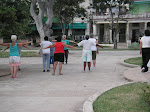
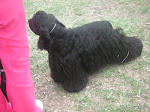
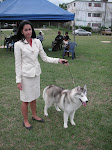








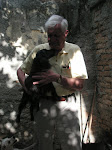





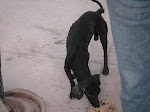



No comments:
Post a Comment